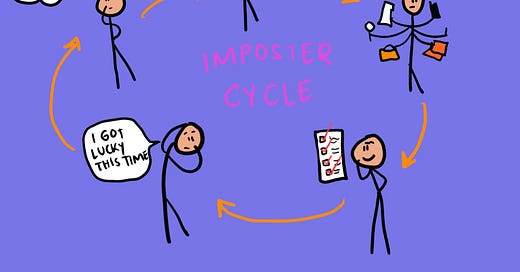🧠 5 Lies Impostor Syndrome Tells Pre-Meds (And the Truth That Shuts Them Down)
Happy Monday!
I hope your summer is off to a great start, whether you're deep in the application cycle, working hard, hitting the books, or finally taking that well-earned break.
Today, we're diving into a topic that hits close to home: the lies impostor syndrome tells us. It's something I've wrestled with for a long time (and probably always will, to some degree). And I know I'm not alone, this quiet self-doubt is something almost every pre-med (and non-pre-med!) faces at some point.
💬 What Is Impostor Syndrome?
Definition: Persistent self-doubt despite evidence of competence.
Who it hits: High achievers, first-gen students, underrepresented minorities, career-changers — sound familiar?
When it shows up: After a bad exam, in clinical settings, during applications, even with success.
Lie #1: “Everyone else has it all figured out but me.”
💬 What it sounds like:
“My classmates already shadowed 5 doctors, started research, and published a paper — I’m behind.”
🧠 Why it's false:
Most pre-health students are figuring it out in real-time, just like you.
People are more likely to share wins than struggles, so comparison is based on incomplete information.
✅ Reframe:
“How can I be behind when no two people walk the same path.”
🪞 Try this:
Ask a peer what they’ve struggled with — you might be surprised. (Note: not being able to name your struggles shows a lack of self-awareness…)
Lie #2: “I got in by accident — they made a mistake.”
💬 What it sounds like:
“I only got this internship/position because I’m lucky, not qualified.”
🧠 Why it's false:
Admissions, internships, and volunteer coordinators don’t choose randomly.
If you were accepted, it’s because someone saw potential, commitment, and capability.
✅ Reframe:
“I was chosen for a reason. I belong here just as much as anyone else.”
🪞 Try this:
Write a list of 3 things you did that helped you earn the opportunity.
Lie #3: “If I struggle, I must not be cut out for this.”
💬 What it sounds like:
“I’m confused in Gen Chem, so there’s no way I can handle med school.”
🧠 Why it's false:
Struggling is part of learning. Even med students and doctors struggle.
Mastery comes from making mistakes, not avoiding them.
✅ Reframe:
“Struggling is a sign I’m growing, not failing.”
🪞 Try this:
Reflect on something you used to struggle with that now feels easier. That’s progress.
Lie #4: “If I ask questions, they’ll think I don’t belong.”
💬 What it sounds like:
“I don’t want to ask in front of everyone, they’ll think I’m not smart.”
🧠 Why it's false:
Asking thoughtful questions is a hallmark of strong students and professionals.
Curiosity and humility are valued in healthcare, not punished.
✅ Reframe:
“Asking for help shows I’m engaged and want to improve, that’s a strength.”
🪞 Try this:
Challenge yourself to ask one question in class or while shadowing this week. See how it goes.
Lie #5: “Once I achieve [X], the self-doubt will go away.”
💬 What it sounds like:
“Once I get a 510, or get into med school, I’ll finally feel confident.”
🧠 Why it's false:
Impostor syndrome doesn’t vanish with accomplishments — it often shifts.
Confidence is built by working through self-doubt, not outrunning it.
✅ Reframe:
“I can feel unsure and still show up bravely, that’s where real confidence begins.”
🪞Try this:
Reflect on a time you pushed through doubt and succeeded. That’s your evidence.
✨ Wrap-Up Prompt
“Which of these lies have you told yourself before? What helps you challenge it?”
→ Great for reflection journal entries, group discussion, or social engagement.




